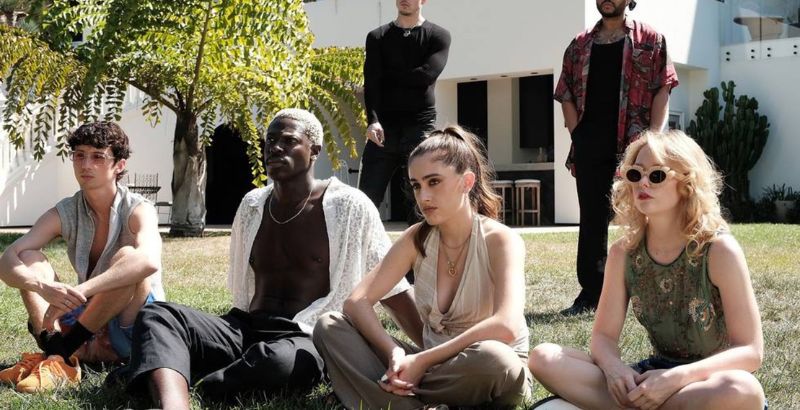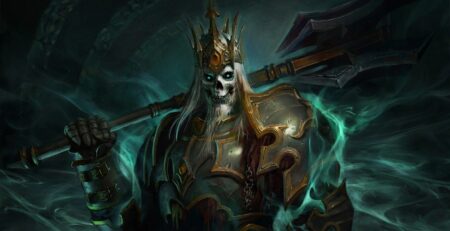
The Idol, from Euphoria creator Sam Levinson, has been in a downward spiral like its lead character since episode one. That said, this episode does start to right the course if even just a little. It’s no secret now that Tedros (The Weeknd) is an egotistical and paranoid abuser. Shaping Jocelyn and her entire house into a palace for himself, The Idol Episode 4, titled “Stars Belong to the World,” is halfway between satire and drama, and it has no idea where it fits when a famous producer comes to help Jocelyn (Lily-Rose Depp) make her new music. Despite the brewing tension between her and Tedros, Jocelyn is determined to introduce her new sound and look to the world and is putting herself through anything Tedros says in order to do it.
Jocelyn’s first recording is probably the best-shot scene of the season as she sings about wanting to be controlled with Tedros’ arms around her. It’s done eerily well in a series that has such a tonal disconnection between the narrative, cinematography, and characters that it’s hard to tell what any given scene is meant to elicit from the audience.
At this point, I can’t keep reviewing The Idol while saying the same thing, which is that Jocelyn and by that token, her actor Lily-Rose Depp is a prop for everyone else. It’s well-established at this point that she is a thing to be saved, controlled, moved, and manipulated. She has no agency or voice yet again. But instead of continually talking about this one point, there are elements of The Idol Episode 4 that work, and that’s where Destiny (Da’Vine Joy Randolph), Jocelyn’s manager, is concerned. She is the voice of reason, a protector, but at the same time, she’s helpless to change what she sees.
In the show’s most voyeuristic moments, those watching the scene are just as uncomfortable. While moments of this disgust played to the camera work in small doses, it’s the elongated elements that the show loses any of the messaging. The strongest episode of the series thus far, the commentary around stars belonging to people and the dehumanization of them for art claws out from under The Weeknd’s terrible acting. The abuse is centered in the episode, described by Destiny as she reports back to Chaim (Hank Azaria), but everything flows into Tedros, sucking the gravitas from moments that should have an impact.
This episode of The Idol gets the closest to realizing the promised look to the underbelly of stardom but is held back substantially by a villain who is more of a clown than a foreboding specter hovering above it all—even when he hides in corners and really tries to be. In fact, much of the abuse we know he is doing to the people in the house is only scary because it’s spoken about, and Destiny sells the tension. Any time it’s Tedros himself, it becomes almost laughable or extremely uncomfortable in a way I’m sure wasn’t intended.

That said, the most shocking moment (pun intended) of the episode is when Xander is put into a shock collar and tries to escape. Tedros’ unhinged thoughts that are enacted by others carry more weight than what The Weeknd brings to the role. It’s an awkward imbalance between Troye Sivan’s fantastic acting in his anger and pain paired with Jocelyn’s lonely malice that gives The Idol Episode 4’s back half and ending that gives the episode legs to stand on, if only when Tedros isn’t in frame. I’m astonished by how much the series stands up when it’s any number of the characters who aren’t Tedros take the focus. Whether it’s Izaak (Moses Sumney), Leia (Rachel Sennott), Chloe (Suzanna Son), or Xander (Troye Sivan), or even the moments where Destiny is trying to reach Jocelyn, there are stellar performances that the audience needs more of to buy fully in.
One other element where the series could have progressed further is with an expanded role for Dianne, who continues to be in the background of everything but is ultimately reserved for small moments with little lines for Jennie Kim. Instead, we just know that she is being tapped to take over “World Class Sinner” as a singer and that she’s signed to Magistrate Records. But the only thing we hear her say and contextualize is a three-line conversation with Jocelyn. It’s frustrating still. But while Dianne has little pull or influence beyond a psychological impact on Jocelyn, the ways in which Jocelyn pushes back on Tedros are interesting to see and show that there is much more moving beneath the surface. I just don’t know if Levinson and crew will let it come up for air.
“Stars Belong to the World” is the best episode so far, but that doesn’t mean it’s great. It just means that in their individual parts, the cast is able to deliver performances with enough connection that gives the audience something to take away. An entire episode about manipulating trauma into art, there isn’t enough exploration into the whys and hows, just what is happening to be enough to hold on to.
The Idol is streaming now on HBO MAX with new episodes every Sunday.
The Idol' Episode 4 "Stars Belong to the World"
-
Rating - 5/105/10
TL;DR
“Stars Blong to the World” is the best episode so far, but that doesn’t mean it’s great. It just means that in their individual parts, the cast is able to deliver performances with enough connection that gives the audience something to take away. An entire episode about manipulating trauma into art, there isn’t enough exploration into the whys and hows, just what is happening to be enough to hold on to.




